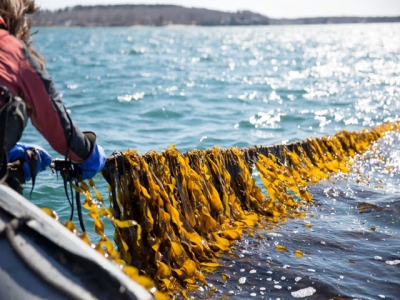Can farmed kelp conquer American markets?

A number of key steps must be taken to ensure the economic and environmental sustainability of the burgeoning US kelp culture sector, according to a new review.
Kelp aquaculture has been expanding on the Maine coastline. Photo Marine Biological Association
The review, published in Aquaculture Reports, has put the long-term trajectory of Maine’s kelp aquaculture industry under the microscope. According to the authors, in order to safeguard the industry’s future sustainability, and to gain both economic and environmental benefits, kelp producers need to prioritise ecosystem management and transparency.
The review took account of the economic and social context of the emerging industry. It also outlined the potential positives and negatives of the industry’s expansion. The authors concluded that kelp farming could be a long-term boon to Maine’s economy and food security, if producers and regulators used ecologically and socially considerate engineering at sites, kept production below the ecosystem’s carrying capacity and protected the health and genetic diversity of wild kelp beds.
The approach in this study
When analysing Maine’s kelp industry, the researchers adopted the ecosystem approach to aquaculture (EAA) model. This framework was developed by aquaculture experts at the FAO and stresses that aquaculture projects should be environmentally conscious, improve human well-being, increase food security and support climate change resilience.
This framework outlines the inputs for production and lets researchers identify the environmental and social issues surrounding Maine’s kelp aquaculture projects. It also allowed the researchers to see the interaction between regulators and producers.
Results
When tracking the production inputs for the EAA analysis, the researchers noted that kelp aquaculture didn’t have the same water, feed, escape or pollutant issues that accompany conventional fish farming. They did, however, add that the industry’s reliance on wild seed could negatively impact ecosystem biodiversity. The concentrated presence of sugar kelp could also compete with indigenous organisms in coastal waters. The researchers recommend establishing a maximum harvest level for seed tissue to preserve wild stocks.
The EAA model identified the net positives of kelp aquaculture. The industry isn’t capital intensive – small-scale operations can get started with minimal inputs. Based on their analysis, kelp farming can supplement or replace income from existing fishing or aquaculture jobs. Kelp is also a highly versatile commodity. Aside from human consumption, it can be used as livestock feed, fertilisers, pharmaceuticals and in cosmetics.
Recommendations
Though the EAA analysis was largely positive, researchers did note potential pitfalls for the industry. According to the EAA framework, production sites shouldn’t threaten ecosystem function or services. This hasn’t been a huge problem in Maine because the industry is small, but it could be in the future.
Because of this, the researchers recommend defining the boundaries of farmed and natural ecosystems. This includes doing an extensive analysis of the wild kelp population and mapping ocean currents. This will allow regulators and producers to prevent habitat degradation and biodiversity losses. It will also protect the health and genetic diversity of wild kelp stocks.
Maine should also conduct an ecosystem and environmental carrying capacity analysis. This type of study measures the ability of an ecosystem to tolerate aquaculture activities without experiencing negative impacts. This would allow regulators to establish evidence-based limits for expansion and make the placement of future sites more strategic.
Ensuring the farm sites don't become a public eyesore is a key way to gain public support
The researchers also recommended simple fixes for the industry: ensuring kelp lines don’t ensnare whales or other marine species and that production sites aren’t eyesores can go a long way towards building public trust in the industry.
On the human side of production, the researchers note that current regulations in Maine prioritise transparency and good management practices. This puts the industry on solid ground for expansion, but there are additional steps that regulators and producers can take.
If Maine can increase the industry’s horizontal expansion and create unified industry standards, the sector could see sustained growth. The authors also note that consumer demand for kelp needs to increase to keep the industry active.
Có thể bạn quan tâm
 US greenlights raw catfish imports from Vietnam
US greenlights raw catfish imports from Vietnam Vietnam’s Tra fish products have been subject to US anti-dumping duties since 2003, with those duties reviewed on an annual basis
 High potential of ornamental fish export
High potential of ornamental fish export For recent years,ornamental fish breeding has developed in Ho Chi Minh City even small-scale ornamental fish farming is also a profitable business.
 Hatchery breakthrough could save Filipino favourite
Hatchery breakthrough could save Filipino favourite A new aquaculture technique developed in the Philippines might help to halt the decline of one of the country’s most prized native fish species.